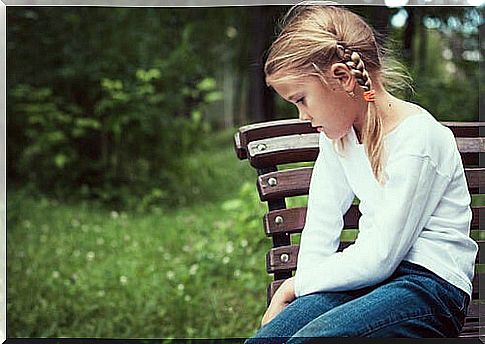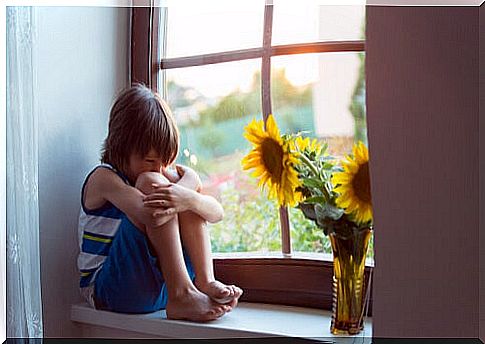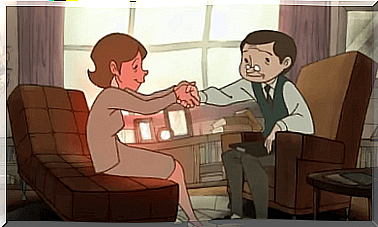My Child Is Not Happy: How Can I Help Him?

As parents, we all want our little ones to grow up happy and healthy. If I perceive that my son is not happy, doubts about my own parental role begin to assail me and the feeling of guilt grows. What am I doing wrong? How can I help you?
First of all, it is essential to know that all emotions play a role in our life and are necessary. Sadness, for example, facilitates the request for help or induces reflection in the face of a readjustment. On the other hand, it is also normal and necessary for children to experience sadness in certain situations.
However, when the frequency and intensity of this sadness are excessive, we must act. This circumstance could lead to childhood depression and have important consequences for the child’s mental health.

My son is not happy
Sadness, as an emotion, tends to influence many vital planes. The internal dialogue finds a slide and pessimism appears like a storm on the horizon. The mood declines, along with interest and motivation. In addition, and especially in childhood, sadness can manifest as irritation, extreme sensitivity, along with appetite and sleep problems.
The main cause of childhood sadness is the feeling of loss, disappointment, or failure. Therefore, there are various everyday situations that can draw that scenario in which my son is not happy.
- Loss of important emotional ties, either due to separation or death.
- Rejection by the rest of the children. Violence or adjustment problems at school.
- Inability to achieve important goals and feeling of failure.
- Lack of self-esteem, feeling of loneliness.
However, the same event does not affect all children equally. Why are there happier little ones and more melancholic ones with similar life stories? Why is it easier for some to perceive the positive side of events and circumstances? The good news is that the environment and its configuration have “only” an influence close to 10% on our psychological well-being.
50% of our happiness comes from genetic factors, while the remaining 40% is determined by our attitude. The thought patterns that we learn and reproduce throughout our lives can really make a difference.
How can I make my child happier?
As we have commented, in the face of the scenario my son is not happy, it will be essential to transmit to the little ones a positive attitude and effective coping strategies. Be a role model in the face of positive and negative events, directing and showing the best routes and resources for good emotional management.
Be a positive attitude role model
Children learn to live by observing, modeling, and imitating them. Your reactions will be a good way for them to decide what disposition to adopt in the face of events. Try to maintain a flexible and proactive mindset when faced with problems. Show your little one how you care, instead of worrying.
It is important to convey to them that certain events cannot be avoided – certain losses, certain errors – but that we can decide what to do before them, how to position ourselves. On the other hand, we can teach them the advantages of being proactive rather than reactive.
Love him unconditionally
Love and security are two of the main needs of every human being. If we do not feel covered in those areas of our life, it is difficult for us to feel good. Love and accept your child unconditionally. Do not try to change him, to compare him with his brothers or friends, do not constantly criticize him.
Spend as much time with your child as you can, get to know him and establish a strong bond. In this way, it will be easier for you to perceive changes in their behavior and the child will feel confident enough to come to you when they need help.

Promotes their self-esteem and autonomy
Confidence in the resources and skills already acquired is in many cases the variable that makes the difference between success and failure. In this sense, knowing that we are valuable and capable of facing difficulties will make it easier for us to overcome any obstacle. To do this, try to increase, over time, the responsibilities that you delegate to your child.
Show him that you are confident in his abilities and do your best to help him build a positive self image. It will be the best help you can give him to achieve his autonomy.
Teach him proper coping strategies
Strategies focused on avoidance or emotions contribute to my child being unhappy. These usually start when we perceive ourselves without resources to resolve the situation. Help your child develop problem-based coping strategies, such as looking for solutions or asking for help.









